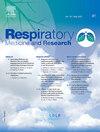了解参与肺癌筛查项目的挑战:来自法国DEP 'KP80试验的发现
IF 1.8
4区 医学
Q3 RESPIRATORY SYSTEM
引用次数: 0
摘要
背景肺癌是全球癌症相关死亡的主要原因。低剂量计算机断层扫描(LDCT)筛查可显著降低高危人群的死亡率。然而,由于各种障碍,肺癌筛查项目的参与率往往不是最佳的。DEP’kp80试验是一项在法国索姆省开展的多中心前瞻性研究,旨在评估LDCT筛查肺癌的可行性。参与者年龄在55-74岁之间,吸烟史超过30包年,于2016年至2020年间招募。对所有参与者进行了问卷调查,以评估参与的动机和障碍。结果共纳入1369名受试者,30.4 %的受试者回答了问卷调查。在应答者中,65% %为男性,平均年龄为61.9岁。参与的主要动机包括与吸烟有关的健康问题(68.7% %)和保健专业咨询(16.5% %)。主要障碍是缺乏邀请(37.5% %)和后勤问题(21.9% %)。值得注意的是,63% %的应答者报告说参与导致了戒烟。此外,关于该计划的最常见信息来源是医疗保健专业人员(85% %)。结论我们的研究强调了医疗保健专业人员在促进肺癌筛查方面的关键作用,并确定了参与筛查的重大障碍。通过有针对性的干预措施解决这些障碍,可以提高筛查的接受程度,改善肺癌的预后。本文章由计算机程序翻译,如有差异,请以英文原文为准。
Understanding participation challenges in lung cancer screening program: Findings from the DEP’KP80 trial in France
Background
Lung cancer is the leading cause of cancer-related mortality worldwide. Low-dose computed tomography (LDCT) screening can significantly reduce mortality among high-risk populations. However, participation rates in lung cancer screening programs are often suboptimal due to various barriers.
Method
The DEP’KP80 trial is a multicentric prospective study conducted in the French territory of Somme, assessing the feasibility of lung cancer screening using LDCT. Participants aged 55–74 with a smoking history of over 30 pack-years were recruited between 2016 and 2020. A questionnaire was administered to all participants to evaluate motivations and barriers to participation.
Results
The trial enrolled 1369 participants, with 30.4 % responding to the questionnaire. Of the responders, 65 % were male, and the mean age was 61.9 years. Key motivations for participation included health concerns related to smoking (68.7 %) and healthcare professional advice (16.5 %). Main barriers were perceived lack of invitation (37.5 %) and logistical issues (21.9 %). Notably, 63 % of responders reported that participation led to smoking cessation. In addition, the most common source of information about the program was healthcare professionals (85 %).
Conclusion
Our study highlights the crucial role of healthcare professionals in promoting lung cancer screening and identifies significant barriers to participation. Addressing these barriers through targeted interventions could enhance screening uptake and improve lung cancer outcomes.
求助全文
通过发布文献求助,成功后即可免费获取论文全文。
去求助
来源期刊

Respiratory Medicine and Research
RESPIRATORY SYSTEM-
CiteScore
2.70
自引率
0.00%
发文量
82
审稿时长
50 days
 求助内容:
求助内容: 应助结果提醒方式:
应助结果提醒方式:


